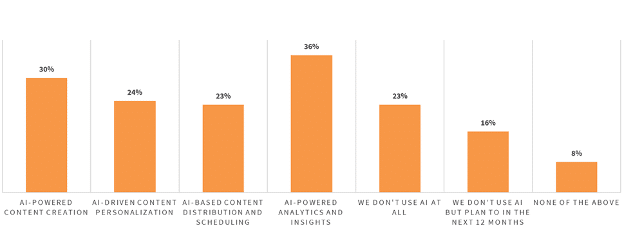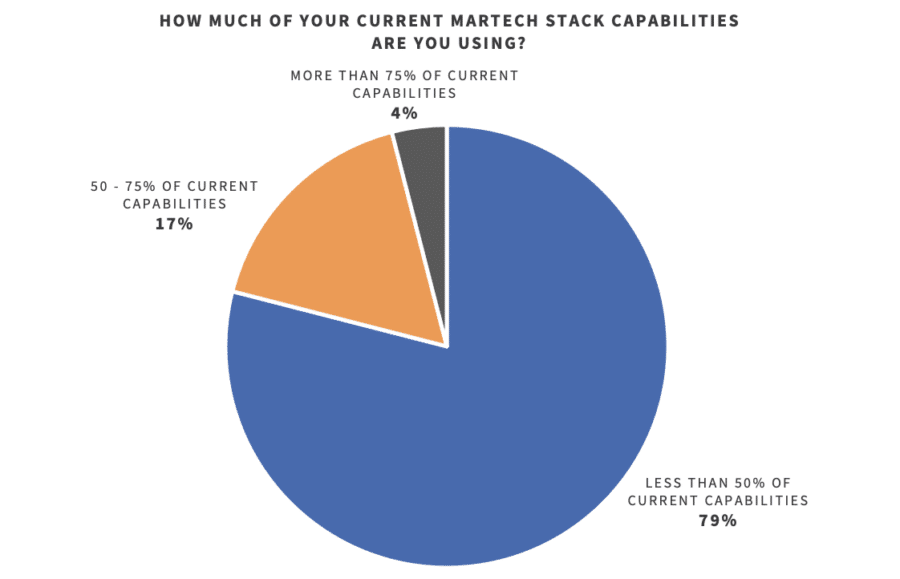Content marketing constantly evolves, shaping how brands engage with their audiences and influence overall marketing strategies. Introducing AI into the content marketing landscape signals a significant shift in the industry. For years, Ascend2 has delivered valuable research to marketing professionals, focusing on emerging trends shaping content marketing strategies’ effectiveness. This year, the study delves into the integration of AI in content marketing, offering insights to help you prepare for the future.
As AI becomes more prevalent, numerous questions arise: How will it affect content quality? What are the best practices for utilizing AI in content creation? And, ultimately, will AI become indispensable to content marketing? This research aims to answer these critical questions, guiding you through the evolving landscape.
Direct access to the research study, Content Marketing and AI in 2024.
The research found that many marketing professionals use AI in content marketing programs.
AI-powered analytics and insights are the most common use of AI in content marketing strategies, with 36% of respondents leveraging these tools. Meanwhile, 30% of respondents use AI for content creation and 24% for personalization, showing a growing trend toward integrating AI to enhance various aspects of content marketing. However, 23% of respondents still do not use AI at all.

For this post, we want to look at using AI to create content, specifically how to do it without sacrificing quality and potentially damaging your brand.
Here are ten practical tips.
1. Set Clear Objectives for Content
Before using AI tools, define clear goals for the content, such as tone, target audience, message, and purpose. AI works best when given specific parameters, so establish a framework for what your content should accomplish.
2. Use AI for Content Drafting, Not Finalizing
AI can accelerate content creation by drafting articles, generating ideas, or outlining content. However, a human touch is essential to refine and ensure the content meets high standards. Marketers should treat AI-generated content as a first draft.
3. Leverage AI for Data-Driven Insights
AI can help analyze data and identify trending topics, relevant keywords, and consumer sentiment. Use these insights to inform content creation, ensuring it is relevant, timely, and targeted to the audience’s interests.
4. Maintain Brand Voice and Consistency
Marketing professionals should guide AI tools to stay aligned with the brand’s tone, language, and voice. Ensure that AI content adheres to style guides or specific brand language rules to avoid generic or inconsistent output.
5. Combine AI with Human Creativity
While AI excels at automating routine tasks, human creativity is vital to producing engaging and authentic content. AI can assist with research or optimization for SEO, but marketers should enhance content with unique insights, storytelling, and creative elements.
6. Use AI for Personalization at Scale
AI can help create personalized content for different audience segments. Professionals can craft tailored messaging using AI-generated templates while ensuring the core message remains consistent across all variations.
7. Continuously Train AI Systems
AI learns and improves over time. Feed it high-quality examples of your preferred content to train it for better results. Regularly update and refine your AI tools based on the content they generate to align with evolving quality standards.
8. Implement Strong Editorial Oversight
Human oversight is crucial to maintaining quality. Review all AI-generated content for accuracy, grammar, tone, and coherence before publishing. AI can sometimes generate content that lacks nuance or depth, which human editors should correct.
9. Test and Iterate Content with AI
AI tools can also be used to A/B test different versions of content, headlines, or calls to action. But as you use AI to generate test ideas, use your experience of testing fundamentals to refine those ideas.
10. Ensure Ethical and Authentic Content Creation
AI content tools can sometimes inadvertently produce misleading or overly promotional material. Ensure all content remains ethical, authentic, and valuable to the audience by applying manual reviews and prioritizing content transparency. For example, ask AI to cite the source of research findings used in your content.
By using these strategies, marketing professionals can effectively integrate AI into their content creation process without sacrificing the quality and authenticity that resonates with their audience.
Learn more about the state of content marketing and AI by downloading the research study Content Marketing and AI in 2024.

